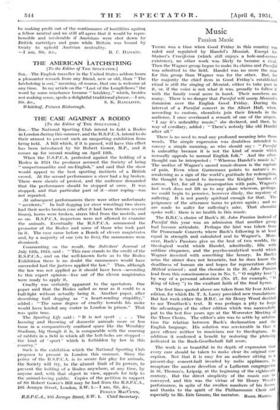Music Passion Music
THERE was a time when Good Friday in this country was ruled and regulated by Handel's Messiah. Except for Stainer's Crucifixion (which still enjoys a hole-and-corner
existence), no other work was likely to become a rival.
Then the Wagner group began to make its claims and Parsifal was admitted to the field. Handel was no more the roan
for this group than Wagner was for the other. But, for
the majority the chief item in Good Friday's established ritual is still the singing of Messiah, either to take part in
it, or, if the voice is not what it was, proudly to follow it
with the family vocal score in hand. Their numbers are many. There is no danger that Parsifal will usurp Messiah's dominion over the English Good Friday. During the interval of a Parsifal concert in the Albert Hall, when, according to custom, choralists join their friends in the audience, I once overheard a remark of one of the singers. " I say it's unhealthy music," she declared, and then, by way of corollary, added : " There's nobody like old Handel after all."
There is no need to read any profound meaning into those words. The simple expression was doubtless intended to convey a simple meaning, as who should say : " Parsifal is unhealthy because it is not the kind of music which normally appeals to normal English folk." And the after- thought can be interpreted : " Whereas Handel's music is." The motive of Wagner's sacred music-drama is the rapture of pain. Even when Gurnemanz points to nature's re- awakening as a sign of the world's gratitude for redemption, the thought is turned to increase the Knights' burden of sorrow. Yet, for all its preoccupation with pain, Wagner's last work does not lift us to any plane whereon, perhaps, we could begin to perceive, however dimly, the mystery of suffering. It is not purely spiritual enough for that. The poignancy of the utterance turns to pierce again ; and we are made to suffer for suffering's sake. That choralist spoke well : there is no health in this music.
The B.B.C.'s choice of Bach's St. John Passion instead of Parsifal this year was an admission that another group had become articulate. Perhaps the hint was taken from the Promenade Concerts where Bach's following is at least equal in strength and calculated zeal to Wagner's. More- over, Bach's Passions give us the best of two worlds, the theological world which Handel, admittedly, fills with sublime eloquence, and the psycho-analytical world which Wagner invested with something like luxury. In Bach's arias the sinner does not luxuriate, but he does know the deadliness of human sin and hopes for regeneration durch lliitleid wissend ; and the chorales in the St. John Passion lead from this consciousness (as in No. 7, " 0 mighty love ") by way of a personal adoration (No. 27, for example, 0 King of Glory ") to the exultant faith of the final hymn.
The first lines quoted above are taken from Sir Ivor Atkins' edition, for which Dr. T. A. Lacey provided new translations. But last week either the B.B.C. or Sir Henry Wood decided to use Troutbeck's text. It was perhaps a pity to forgo the advantages of the other edition which was successfully put to the test five years ago at the Worcester Meeting of the Three Choirs. The editor's aim was to settle by arbitra- tion the relation between Bach's declamation and the English language. His solution was serviceable in that it gave offence neither to musicians nor to theologians. In addition it conferred a benefit by restoring the phrasing indicated in the Bach-Gesellschaft full score.
The work is so beautiful in its depth of expression that every care should be taken to make clear its original con- ception. Not that it is easy for an audience sitting in 8 present-day concert-hall invaded by radio appliances, to recapture the austere devotion of a Lutheran congregation in St. Thomas's, Leipzig, at the beginning of the eighteenth century. But the direct simplicity of the music can he conveyed, and this was the virtue of Sir Henry Woods performance, in spite of the swollen numbers of his forces, and thanks to the spirit of the Philharmonic Choir and especially to Mr. Eric Greene, the narrator. BASIL MAINE.








































 Previous page
Previous page